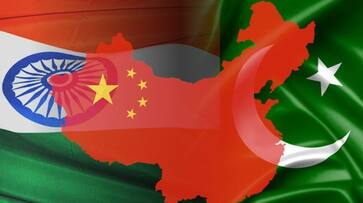Chinese Ambassador to India Sun Weidong has stated that China wants India and Pakistan to join hands. China stressed that it sincerely look forward to good relations between China and India, China and Pakistan as well as India and Pakistan, he added. India has consistently maintained that talks and terror cannot go hand in hand.
New Delhi: China wants India and Pakistan to have good relations and join hands for promoting peace and stability in the region, said Chinese Ambassador to India Sun Weidong.
Speaking exclusively to ANI on the recently concluded informal talks between Chinese President Xi Jinping and Prime Minister Narendra Modi, he said, "Both China and India are major countries with important influence in the region. The two leaders had in-depth communication on the regional situation. China stressed that it sincerely look forward to good relations between China and India, China and Pakistan as well as India and Pakistan. We hope to see countries in the region join hands in promoting regional peace and stability and realising development and prosperity."
Relationship between India and Pakistan got strained in the aftermath of Pulwama terror attack in February that left 40 CRPF personnel killed.
Pakistan-based Jaish-e-Mohammed claimed responsibility of the attack, following which India destroyed their terror camp at Balakot in an aerial strike on February 26.
The relations between the two countries got further strained when Pakistan objected to the abrogation of Article 370 in the Indian state of Jammu and Kashmir, which remains an internal matter for India. Islamabad even downgraded diplomatic relations with New Delhi.
Despite repeated verbal offensives on different forums, Pakistan was globally isolated globally and found little support on the issue, while all the major world powers including Russia, France, US endorsed India's action of abrogating Article 370 as the country's internal matter.
Before Chinese President Xi Jinping's visit to India, Pakistani Prime Minister Imran Khan had also visited Beijing along with his Army Chief and raised the issues of Kashmir and CPEC during his engagements.
India has consistently maintained that talks and terror cannot go hand in hand. Therefore, China's pitch to revive India- Pakistan relations is unlikely to yield any outcomes in the present scenario.
When MyNation spoke to senior lawyer, international relations expert, ex media chief of the BJP, Amitabh Sinha, he highlighted the possible hidden agenda of China.
“China basically has taken an interest in Pakistan. Earlier they had geostrategic interest but now they have commercial interests. But this will harm China in a destructive way. China is already facing economic crisis,” stated Amitabh Sinha.
Sinha further added that China’s nature is not new and that it is a country that is unreliable. “However, India is very smart under the leadership of PM Modi. So we will not be affected by all this,” said Sinha.
BJP's national spokesperson Narendra Taneja said, “Our relationship with Pakistan is a bilateral issue. India’s stand is clear: no role for any third party or country in India- Pakistan relations. Our PM and Chinese President have just agreed to further strengthen the bilateral relations. India and China relationship is independent of our relationship with any other country or any third country, including Pakistan.”
Interestingly, Pakistan has announced that it is going to host SAARC summit in which India will also be invited as a member country. However, earlier also Pakistan's efforts to draw consensus on full participation in the South Asian regional forum failed to yield results.
Chinese envoy to India also said that during the recent Modi-Xi talks, China also proposed expanding the scope of dialogue in order to extend cooperation in the region.
"The Chinese side also put forward its proposition on promoting cooperation under the "China-India+" mechanism, that is to extend the cooperation model to other countries in South Asia, Southeast Asia and Africa on the basis of the "China-India + Afghanistan" cooperation," Sun told ANI.
He also said that closer cooperation between China and India will have an important and positive impact on the building of a fair and equitable international order.
"China proposes that China and India play a leading role in regional inter-connectivity and work to build a more open connectivity network", Weidong added.
Last Updated Oct 19, 2019, 12:39 PM IST









![Salman Khan sets stage on fire for Anant Ambani, Radhika Merchant pre-wedding festivities [WATCH] ATG](https://static-gi.asianetnews.com/images/01hr1hh8y86gvb4kbqgnyhc0w0/whatsapp-image-2024-03-03-at-12-24-37-pm_100x60xt.jpg)
![Pregnant Deepika Padukone dances with Ranveer Singh at Anant Ambani, Radhika Merchant pre-wedding bash [WATCH] ATG](https://static-gi.asianetnews.com/images/01hr1ffyd3nzqzgm6ba0k87vr8/whatsapp-image-2024-03-03-at-11-45-35-am_100x60xt.jpg)


